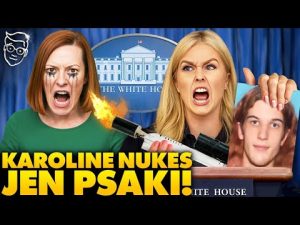In the aftermath of yet another tragic shooting, the narrative continues to unfold, and predictably, certain political figures have seized the moment to spin their web of blame and critique. Former White House Press Secretary Jen Psaki wasted no time redirecting attention from the actual event to an all-too-familiar political punching bag: Donald Trump and his administration’s crime policies. Perhaps it’s a symptom of a larger disdain for both reflection and respectful discourse in the political arena. Instead, she took to the online platform X to argue that prayer is futile in solving the problem of school shootings. Psaki seemed to suggest that praying is as effective as a paper umbrella in a rainstorm, missing perhaps the broader tapestry of solutions.
While it isn’t new for the left to shrink from embracing traditional values like prayer and community support in difficult times, the boldness with which they brand these values as outdated is quite something. It’s fair to say that the American people, weary from repeated heartache, might be looking for a blend of policy and the spiritual grounding that many find in prayer. Meanwhile, the finger-pointing continues, with Psaki’s comments drawing attention away from the solemnity of the occasion, making it more about a political agenda rather than searching for real-time solutions.
On the practical side of matters, former President Trump reached out to Minnesota, expressing condolences and an offer to provide federal support. On a day when politics could take a backseat, Trump’s response showed leadership and genuine concern, bringing together his team to address issues head-on. Not everyone’s on board with that plan—all the more surprising when D.C. Mayor Muriel Bowser expressed concern about the trustworthiness of increased federal law enforcement in the city. Evidently, safer streets and lower crime rates, with a notable 87% decrease in carjackings, can’t compete with theoretical drawbacks.
And then there’s the emotional side of things: covering the human tragedy with compassion and a dose of indignation. Mary Katherine Hamm emphasized how important it is to maintain faith during such times. She bravely shared how prayer sustained her through personal tragedy, underscoring that prayer doesn’t always prevent tragedy, but it provides the strength to persevere. Her perspective offers a poignant reminder that for many, prayer is not just ritualistic, it’s a lifeline.
Lastly, in a rather refreshing twist, the topic of crime crackdowns makes a return to the spotlight, with an acknowledgment that most voters aren’t particularly interested in complex statistical debate—you know, just more fodder for perfect dinner-party conversation. It seems crystal clear that the American public, burdened by talk without action, simply wants the roads safer and crime rates lower. Democrats promoting the idee fixe of eliminating prayer from the dialogue and simultaneously opposing crime crackdowns might be alienating regular folks who believe in solid community values.
In essence, as politicians scramble to find ways to outdo each other in response measures, one wonders if turning down the volume on the rhetoric could lead to genuine dialogue. Rather than deride the traditional pillars of faith and tough on crime strategies, embracing them as part of the solution could send a far more resonant message to the many Americans caught in the middle of this cacophony.







